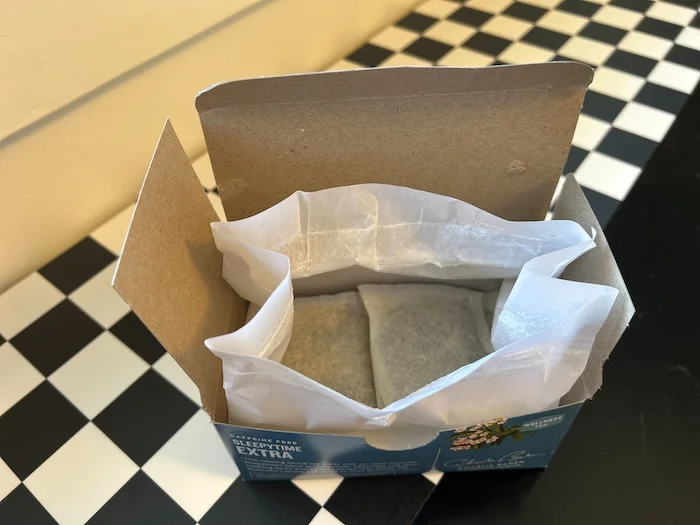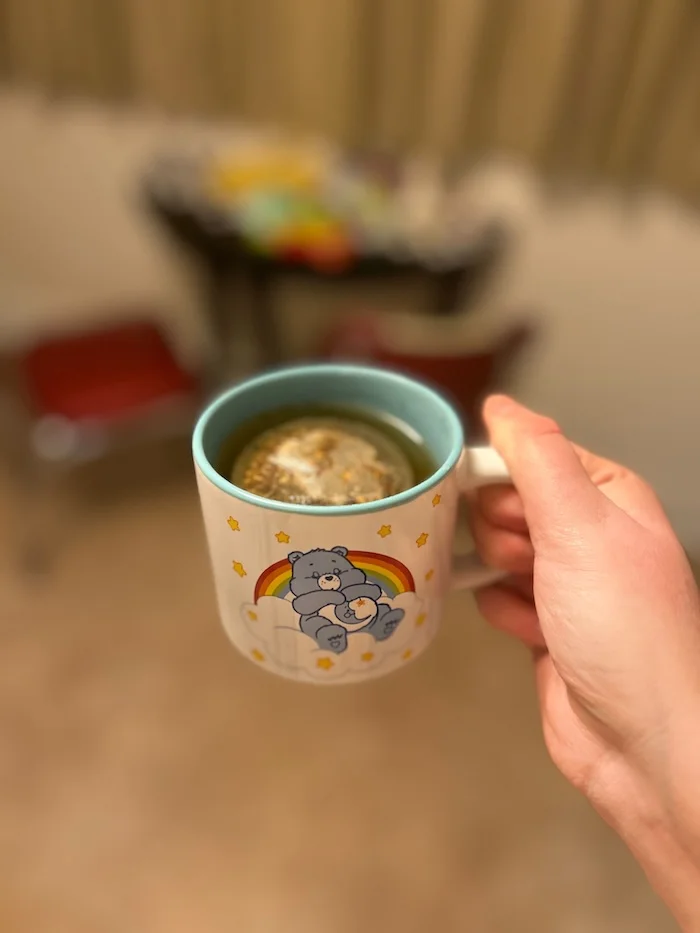Having a ritual to wind down before bed is important to get your mind and body prepared for sleep. Some brew a cup of tea to enhance their nighttime routine, but did you know there are a plethora of teas out there that are deliberately formulated to help you relax?
These nighttime teas use a blend of natural ingredients like chamomile flowers, lemon balm, and passionflower. They’re high in compounds called flavonoids, which “are believed to have sedative and calming effects,” per dietitian Sydney Lappe, RD. “While these might seem like they’re just for flavor, many of them may actually support relaxation and sleep in their own right,” she adds.
But do they really work? Well, our team spent a few nights brewing some of the top sleep teas to see which can act as a natural sleep aid and promote better sleep quality. Here’s a hand-picked list of the best teas for sleep that came out on top. Any should be a welcome addition to your bedtime routine.
The 5 Best Teas for Sleep
- Celestial Seasonings Sleepytime Extra – Best Tea for Sleep Overall
- Pukka Nighttime Berry – Best-Tasting Tea for Sleep
- Yogi Bedtime Tea – Best Herbal Tea for Sleep
- Adagio 40 Winks – Best Loose Leaf Tea for Sleep
- Republic of Tea Get Some Zzzs – Best Tea for Anxiety and Sleep
Disclaimer: Please note that the content in this article is meant for informational purposes only and should not be construed as medical advice or serve as a substitute for seeing a medical professional regarding any sleep problems you may have. Please see your doctor regarding any urgent medical issues.
Best Teas for Sleep Video
Note: Our video review is more recent than our written one and might differ slightly.
What I Looked for in the Best Tea for Sleep
As mentioned, we tried out these teas for a few nights to get a feel for how well they performed for promoting sleep. More than that, though, we also considered the composition of the tea, the taste, and even the price, and how it affected our overall experience.
- Formulation: First and foremost, we took a look at what’s inside all of these teas. Different supplements can be more potent than others. Valerian root, as an example, has a deeper sedative effect than a calming chamomile. This means I might up a score for the inclusion of this ingredient, whereas a chamomile-only tea would get a lower one. More than this, we also looked at the specific content of each ingredient to see if there was enough to achieve the desired effect or if it was just added as an afterthought. Further, some brands use what’s called a “proprietary blend,” which means they don’t have to list the exact amount of each ingredient. This can be a problem for consumers seeking transparency because the manufacturer might dilute the blend with more better-tasting ingredients than those that induce relaxation. Taking all of this in mind, we rated the formulation out of 5.
- Taste: This is the most subjective area, as what one finds palatable varies from tester to tester. We therefore tried to describe the taste (and intensity of it) in detail alongside our opinion of it to recognize that our readers might find it more or less appealing. If we can tell which ingredient is the most potent on the tongue, we’ll make note of that, too. We also gave each tea a taste score out of 5, but note that you may have a different palate.
- Effects: Finally, we took into account whether or not these teas promoted a restful sleep, or at the very least, helped us relax before bed. Wenoted any caveats, such as whether we had caffeine earlier, as well as whether or not it could be a placebo effect.
All of this and more factored into our enjoyment of the tea brewing and tasting experience, which we’ll dive deeper into below.
Celestial Seasonings SleepyTime Extra – Best Sleep Tea Overall
Celestial Seasonings Sleepytime Extra
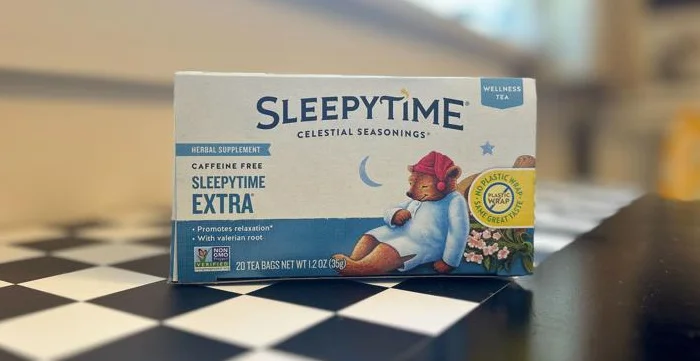
Budget-friendly and caffeine-free, this herbal tea has been a natural sleep aid for years, and is one of our favorites for nighttime relaxation.
Pukka Nighttime Berry – Best-Tasting Tea for Sleep
Pukka Nighttime Berry

With a fruity and herbal profile, this berry tea goes down smooth and is made with organic ingredients.
Yogi Bedtime Tea – Best Herbal Tea for Sleep
Yogi Bedtime Tea
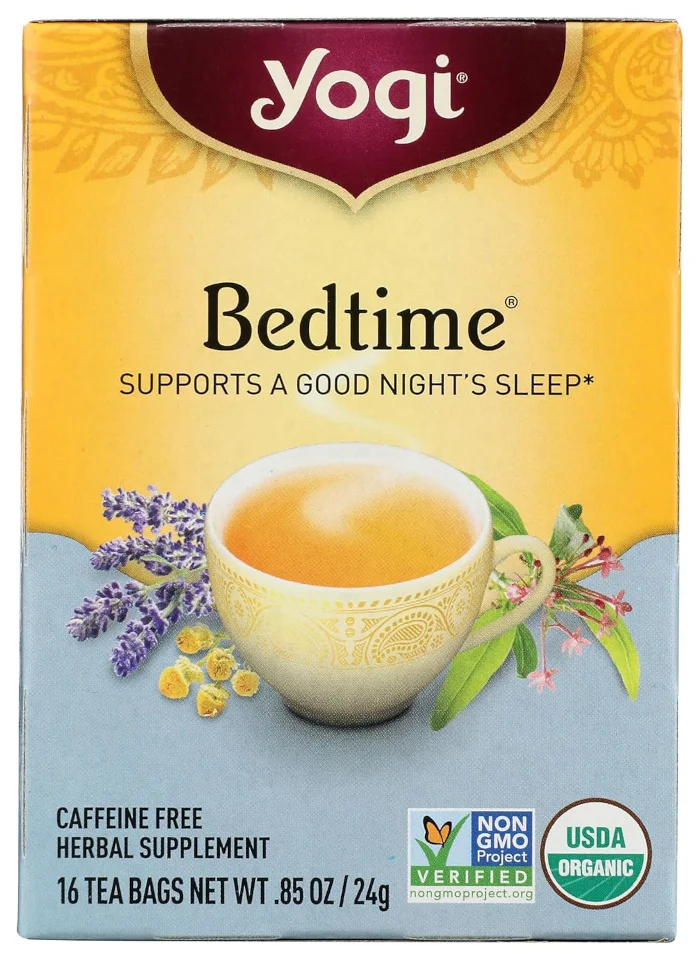
An herbal tea that, true to its name, instills calmness with a blend of chamomile, valerian root, and other botanicals.
Adagio 40 Winks – Best Loose Leaf Tea for Sleep
Adagio Teas 40 Winks
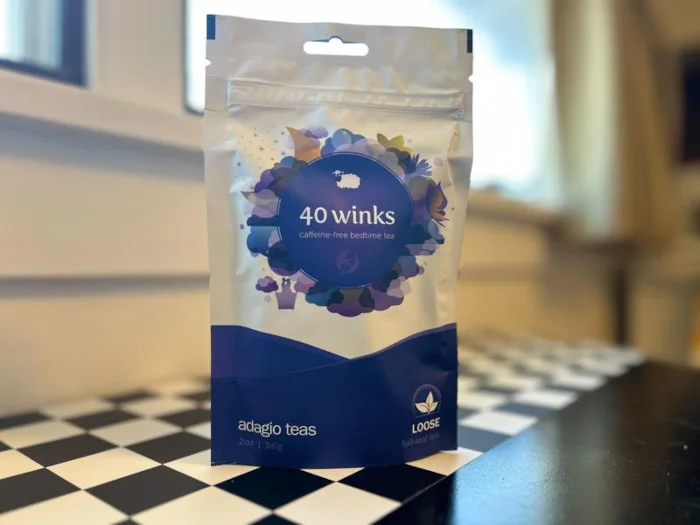
A loose leaf tea, this blend allows you to customize the dosage for optimized sleep and relaxation.
Republic of Tea Get Some Zzzs – Best Tea for Anxiety and Sleep
Republic of Tea Get Some Zzzs

This caffeine-free tea is made with an adaptogen formula meant to calm you down and assist with both anxiety and sleep.
Other Teas for Sleep I Considered
If nothing on the list piques your fancy, here are some other teas that we gave the college try:
Bigelow Cozy Chamomile
Bigelow keeps it simple with this chamomile tea, which only contains one thing: chamomile flowers. The result is a simple, affordable, and mild-tasting tea that should help you unwind. It doesn’t have many of the other high-roller ingredients you see in the herbal blends above, so it may not be a powerful option to induce sleep. However, if you’re looking to build a before-bed tea routine, brewing and drinking chamomile tea like this might be a good place to start.
Hey Girl It’s Bedtime: Sleep & Dream for Tomorrow
Our tester Cait Giddings thought this was the best-tasting tea she’s ever tried. It’s made with orange peel and stevia for a sweeter, citrus flavor. Aside from the typical relaxation players of valerian root, passionflower, chamomile, and lemon balm, this tea contains an unexpected ingredient: catnip herb — though Cait noted that the tea never induced a reaction from her feline friends. We decided to leave it off our list due to Cait’s gripes about the long steep time (10 minutes) and above-average pricepoint (about $20 for 18 tea bags).
How We Picked and Tested These Sleep Teas
Let’s dive deeper into what makes a good sleep tea, looking at what’s inside and what it does to promote quality sleep.
Formulation
You may have heard of common types of tea like green tea, black, tea, and finally, herbal teas. The majority of sleep teas are herbal teas, which are often caffeine-free or have otherwise low or negligible caffeine content. Caffeine is a main player in keeping the nervous system awake when we’re trying to wind down. This is why it’s recommended to monitor your caffeine intake many hours before you’re ready for bed.
Herbal teas can be one type of herb or blends. Sleep tea blends can contain a mix of ingredients for both taste and to promote sedative effects, with some falling in both categories. Popular choices are chamomile, passionflower, lavender, and lemon balm, which all contain apigenins, a type of flavonoid known for its anti-inflammatory, antioxidant, and sedative properties. Reasons for adding others are more anecdotal, such as peppermint having a nice taste and soothing effect on the tongue.
A common ingredient you’ll see is valerian root, which has a more potent effect in causing drowsiness to sleepers, albeit in higher doses. I tend to opt for valerian teas as I find them more sleep-promoting than those without it.
Some teas may contain supplements like GABA, l-theanine, or melatonin. The lattermost is a hormone that helps regulate sleep and your circadian rhythm. Since melatonin can help trigger the sleep cycle, it might be more powerful than a traditional tea blend, so be sure to read the fine print and check with a healthcare professional if you have any concerns.

As you’re reading the label of your tea bag or box, you might notice the words “proprietary blend.” This means that the brand doesn’t have to advertise how much of each ingredient is in the blend in order to prevent its formulation from being copied. Some testers (like yours truly) may knock off points for this, as I prefer transparency when I’m putting something in my body. It also lets you know if the ingredient you bought it for (such as valerian root) is actually a major player in the formulation, rather than just added for brownie points.
Taste
Just as teas can vary in formulation, they can vary in taste. Some teas have floral notes, like lavender tea or passionflower tea. Citrus notes can come from orange peel or lemongrass. Others might taste woodsy or earthy, thanks to the inclusion of valerian root. If you don’t know which flavor you prefer, choosing a sleep tea can feel like throwing darts on the wall and hoping something sticks.
This is why our testers tried to describe the flavor in detail and which ingredients are likely responsible. I recommend chamomile tea for newbies, as it has a mild flavor that’s just a step up from nothing. I also loved the berry flavor of the Pukka Nighttime Berry tea if you’re wanting something that packs a punch.
Taste is subjective, so don’t be afraid to get a variety pack and find out which notes are your favorite. From there, you can whittle down the options on the market.
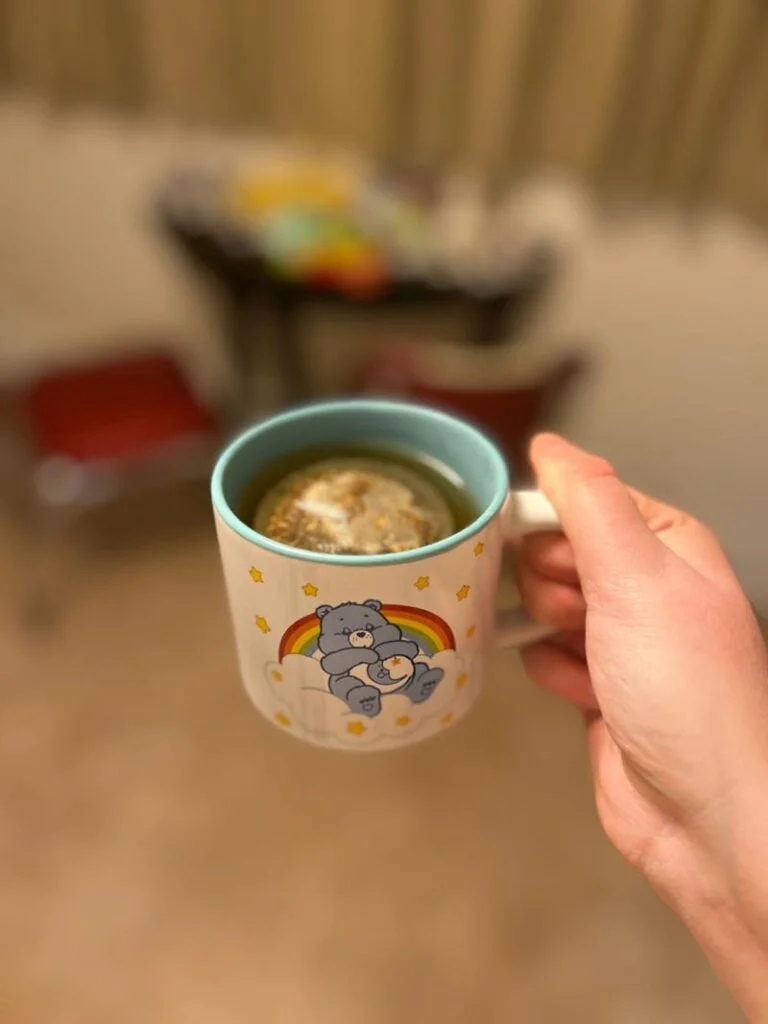
Effect
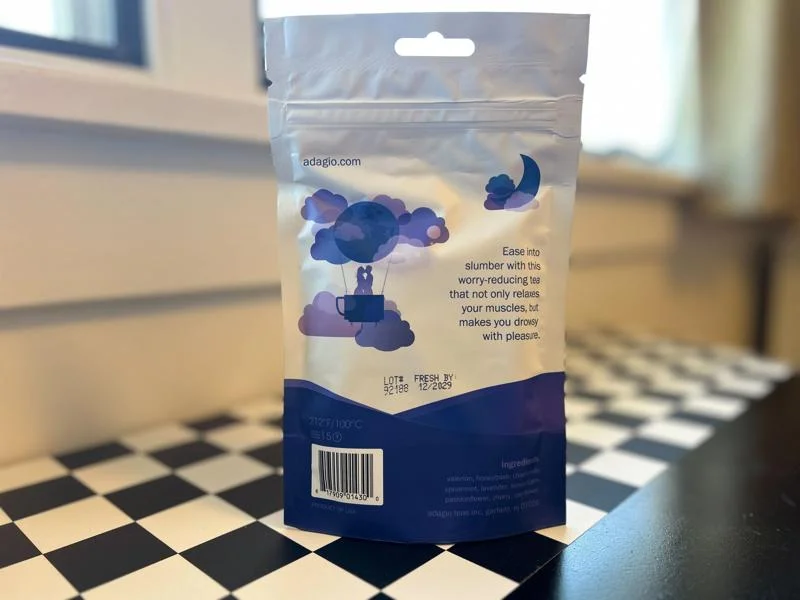
It’s important to note that the studies mentioned show that the efficacy of these teas and the herbs within them are varied. We made note of whether or not we felt the tea contributed to feelings of sleepiness, and a number of our testers found the ritual of brewing tea every night helped them get ready for bed, regardless of which tea they used. Some had us feeling sleepy, but you’ll notice that many didn’t “knock us out.” I think that sleep teas are great for folks who are wary of using more potent sleep aids, allowing them to have a natural come-down from the high energy or stresses of the day.
Our chief medical advisor Dr. Raj Dasgupta notes that herbal or decaffeinated tea is unlikely to be a catch-all for sleep problems or disorders. “Decaffeinated tea by itself can never solve your sleep problems, but if it helps you feel more comfortable and relaxed at night, then it can be a good addition to your night-time routine,” he explains. He also recommends engaging in better sleep hygiene, such as setting a bedtime and putting screens away long before you get into bed, to promote healthier sleep — and, ultimately, overall wellness.
What to Consider When Buying Sleep Tea
If you’re still stuck on which to choose, here are some other aspects of finding the right tea that might be important to you.
Preparation
Some folks have the time or energy to prepare a loose leaf tea before bed, lovingly spooning out each dose into a strainer. Others might just want to slap a bag in some pre-boiled water and call it done. It’s best to find out which tea-drinker you are before you commit to a long preparation process.
Our testers took notes on how easy or frustrating they found the process of making their tea and gave it a score out of 5 for preparation. This will differ whether your tea comes loose or in pre-portioned bags. Some have longer steep times, which means you might be sitting around waiting for your tea to turn opaque. On our list, we have plenty of “grab-and-go” teas, as well as more delicate options for the experienced connoisseur.
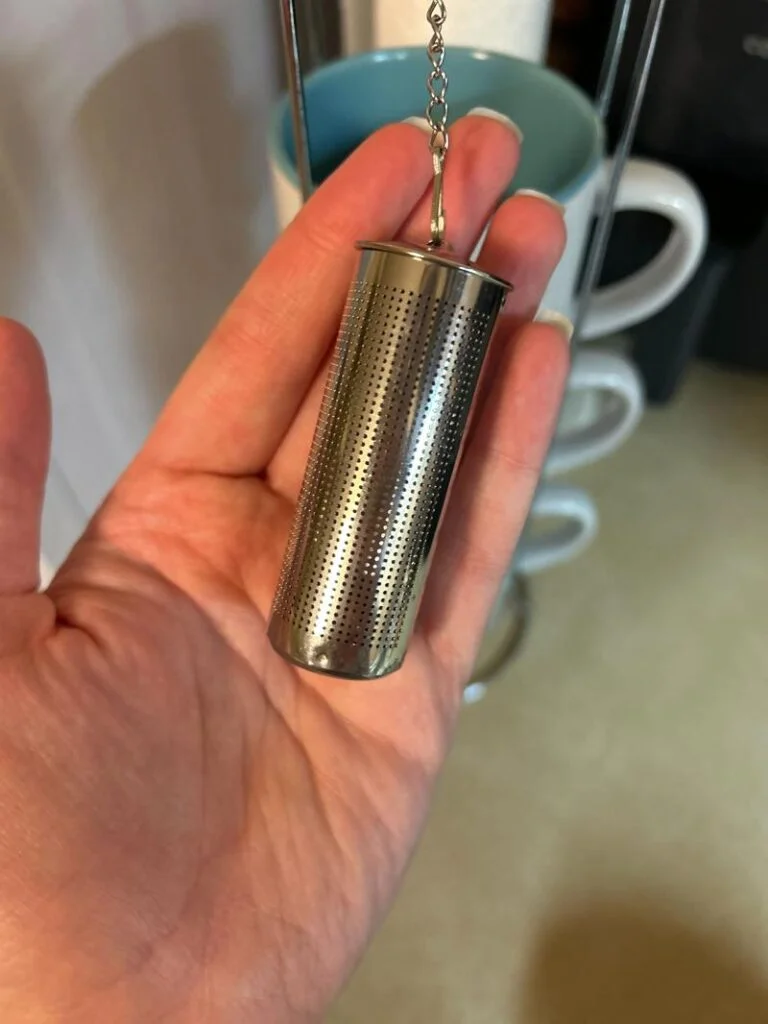
Quantity
Teas can come pre-packaged with 20 or so bags in one box, or they can come in however many ounces if it’s loose. How much you buy will depend on how much of an avid tea-drinker you are, such as how long you plan to drink and how often you plan to drink. Be sure to consider the price as well, as you may not want to spend a lot on a small amount if you’re looking for something that will last you months.
Price
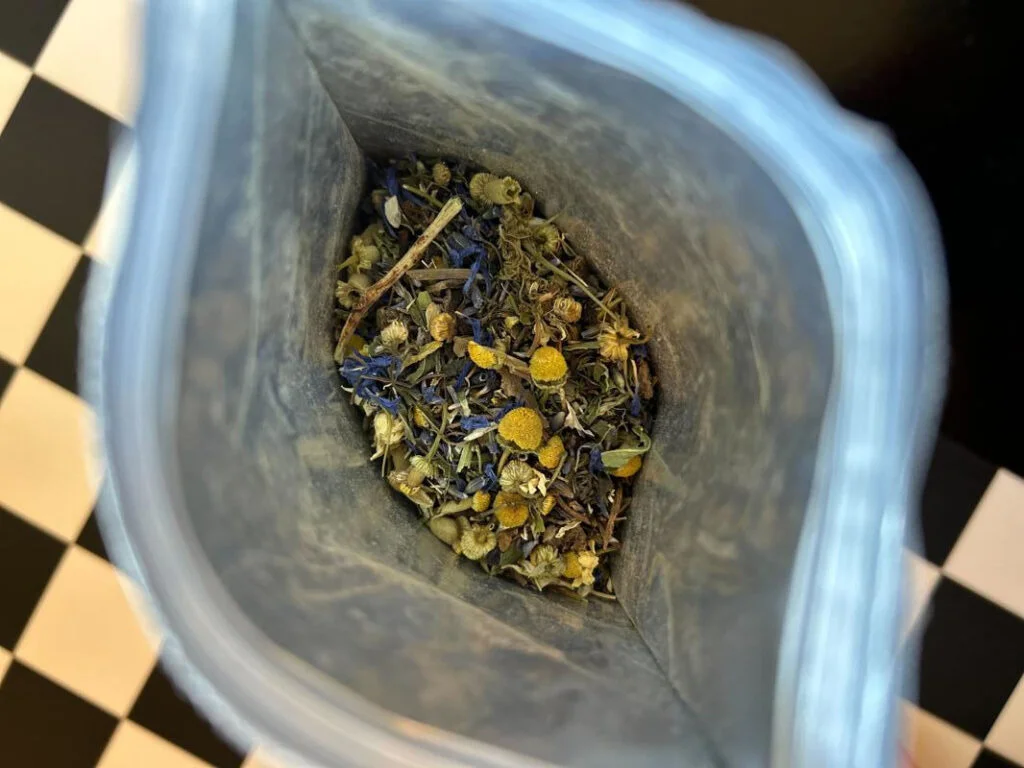
Some folks may not want to fork over a lot of money for sleep tea, especially if they’re just getting into the habit or they’re worried it may not work for them. We have a range of offerings from simple, budget-friendly tea bags to more curated loose leaf teas for your perusal.
If you’re curious about finding your own deal, I recommend looking at the price per serving rather than how much a whole lot costs. Generally, I think around $0.30 to $0.60 per serving is more than reasonable.
Possible Side Effects
As with any supplement to your diet or routine, be sure to consult with your doctor before making any major changes. Some innocuous-seeming ingredients can react poorly with preexisting health conditions or prescription medications, causing detrimental side effects. Also, since you are taking this tea to wind down, be sure not to drink it before any activity where you’ll need to be alert.
FAQs
What tea is best for sleep?
I recommend Celestial Seasoning’s SleepyTime Extra tea for sleep. The Sleepytime Tea line in general is good, but I’ve found the most success with the “extra” version, likely due to its use of valerian root alongside other ingredients. I double up on bags for taste and effectiveness.
Does chamomile tea make you sleep?
Chamomile flowers have natural antioxidant and relaxing properties, which is why they are often used in sleepytime teas. However, research is mixed as to whether chamomile will “make you” sleep. It may certainly help you relax in time for bed.
Who should not drink sleep tea?
Don’t drink a sleep tea if you are sensitive or allergic to any of its components. Always double check that none of your prescription medication interacts with any ingredients. If you are going to engage in an activity that requires alertness and focus, like operating a motor vehicle, I wouldn’t recommend drinking tea with possibly sedative effects. Always speak to your doctor or healthcare provider if you’re suffering from any sleep disorders, especially before trying to supplement treatment with sleep teas.
Sources
- Brock, C., Whitehouse, J., Tewfik, I., & Towell, T. (2013). American Skullcap (Scutellaria lateriflora): A Randomised, Double-Blind Placebo-Controlled Crossover Study of its Effects on Mood in Healthy Volunteers. Phytotherapy Research, 28(5), 692–698. https://doi.org/10.1002/ptr.5044
- Shinjyo, N., Waddell, G., & Green, J. (2020). Valerian Root in Treating Sleep Problems and Associated Disorders—A Systematic Review and Meta-Analysis. Journal of Evidence-Based Integrative Medicine, 25(25). https://doi.org/10.1177/2515690×20967323
- Snel, J., & Lorist, M. M. (2011). Effects of caffeine on sleep and cognition. Progress in Brain Research, 190, 105–117. https://doi.org/10.1016/b978-0-444-53817-8.00006-2
- Salehi, B., Venditti, A., Sharifi-Rad, M., Kręgiel, D., Sharifi-Rad, J., Durazzo, A., Lucarini, M., Santini, A., Souto, E. B., Novellino, E., Antolak, H., Azzini, E., Setzer, W. N., & Martins, N. (2019). The Therapeutic Potential of Apigenin. International journal of molecular sciences, 20(6), 1305. https://doi.org/10.3390/ijms20061305
- Dashwood, R., & Visioli, F. (2025). l-theanine: From tea leaf to trending supplement – does the science match the hype for brain health and relaxation?. Nutrition research (New York, N.Y.), 134, 39–48. https://doi.org/10.1016/j.nutres.2024.12.008
- Fatemeh, G., Sajjad, M., Niloufar, R., Neda, S., Leila, S., & Khadijeh, M. (2021). Effect of melatonin supplementation on sleep quality: a systematic review and meta-analysis of randomized controlled trials. Journal of Neurology, 269(1). https://doi.org/10.1007/s00415-020-10381-w





























